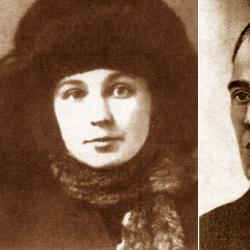And what should the boy do with her? Analysis of the poem by M.I. Tsvetaeva "Where does such tenderness come from?" (linguostylistic comparison of the original text and English and French translations). Love in verse
— Categories
- Aviation (106)
- Astronomical phenomena (16)
- Atmospheric convective phenomena (13)
- Atmospheric optical phenomena (29)
- Atmospheric electrical phenomena (8)
- Butterflies (8)
- VATICAN CITY (23)
- Vladimir Dzhanibekov (8)
- Aquarius (17)
- Around the Solar System (48)
- Questions and Answers (1377)
- Habsburgs (14)
- Harems (7)
- Deep space (45)
- Distant countries (497)
- The road is life (25)
- Animals (205)
- Mysteries of history (445)
- NOTABLE NAMES (364)
- Castles and Palaces (26)
- HEALTH (134)
- Earth (74)
- Art (172)
- Love stories (110)
- HISTORY (704)
- The Story of a Poem (1507)
- The story of one painting (267)
- Books for children (185)
- The beauty of branches depends on the roots (24)
- Legends and myths (83)
- FACES OF HISTORY (496)
- INTELLIGENCE FACES (144)
- PEOPLE (11)
- Legendary people (95)
- LIGHTHOUSES (9)
- Michelangelo Buonarroti (25)
- Microbiology: VIRUSES and BACTERIA (8)
- MICROworld (10)
- Fashion (27)
- Moscow (25)
- Museums (86)
- Napoleon Bonaparte (51)
- Insects (17)
- SCIENCE (169)
- Clouds (11)
- Weapons (11)
- DISCOVERIES and INVENTIONS (167)
- First among equals (120)
- Poetry (498)
- Holidays (14)
- Proverbs (30)
- Prose (367)
- Past and present of Tashkent (133)
- Psychology (43)
- Birds (99)
- Plants (47)
- Records (17)
- Romanovs (41)
- Russia (463)
- Gardens and parks (26)
- Samarkand - the capital of Tamerlane (21)
- St. Petersburg (74)
- Symbols (67)
- Sculptors (13)
- Cathedrals and Mosques (56)
- Human destinies (827)
- SECRETS and RIDDLES (199)
- Tashkent (17)
- Uzbekistan (104)
- Porcelain (7)
- Photos (255)
- PHOTOGRAPHERS and their photographs (163)
- Fra Beato Angelico (13)
- ARTISTS (373)
- FLOWERS (30)
- TEA (17)
- TO BE REMEMBERED (493)
- EXPEDITIONS and FINDS (255)
- YUSUPOV (21)
— Search by diary
— Subscription by email
— Interests
— Regular readers
— Communities
— Statistics
Marina Ivanovna Tsvetaeva. “Where does such tenderness come from?”
Marina Ivanovna Tsvetaeva
Where does such tenderness come from?
Not the first - these curls
I smooth out my lips
I knew someone darker than you.
The stars rose and went out,
Where does such tenderness come from?—
The eyes rose and went out
Right before my eyes.
Not the same hymns yet
I listened in the dark night
On the singer's chest.
Where does such tenderness come from?
And what should you do with her, boy?
Crafty, wandering singer,
With eyelashes - no longer?

Marina Tsvetaeva met Osip Mandelstam in Koktebel at the dacha of the poet Maximilian Voloshin.

However, this meeting was fleeting and did not leave any trace in the poetess’s soul. She discovered Mandelstam as a poet and a person much later, when in 1916 he unexpectedly appeared on the threshold of her Moscow house in Borisoglebsky Lane.

Borisoglebsky lane, building 6 (white building)
A few days spent in the capital changed the lives of these two people. They sincerely fell in love with each other, although the romance that broke out was rather of a literary nature. After parting, the poets exchanged poems, dedicating them to their sublime love, but never crossed the forbidden line that was drawn between these two people by mutual agreement.
Osip Mandelstam tried not to advertise his feelings, because he understood that he could not have anything in common with a fairly famous poetess, who, moreover, had recently reconciled with her own husband and returned to the family. Tsvetaeva, on the contrary, literally bombarded Mandelstam with love poems, believing that expressing her feelings in this way was noble and very aristocratic. One way or another, she dedicated several dozen works to her new acquaintance, among which was the poem “Where does such tenderness come from?”, written in 1916.
Mandelstam himself called this work a revelation, because in it Tsvetaeva for the first time spoke openly about her feelings. Already from the first line, she asks herself where such tenderness came from in her soul for a person with whom she had known for less than three days. The poetess admits that she “knew the lips” of other men, and they gave her much more pleasure. She had the opportunity to stroke thicker and silkier curls, and also listen to exquisite declarations of love that remained forever in her heart. But the poetess did not experience such amazing and all-consuming tenderness for any man as for Osip Mandelstam, who unexpectedly burst into her life and managed to change it beyond recognition.
Tsvetaeva refers to her new acquaintance only as “the crafty, wandering singer,” indirectly accusing her of being the person who deprived her of peace of mind. The poetess does not feel love for Mandelstam in the generally accepted sense of the word, but something much more. Later, Tsvetaeva admitted that she met a person whom she could understand without words. And this amazing kinship of souls made a much greater impression on her than Mandelstam’s appearance and poetic gift.
The poetic form allows the poet to express feelings, experiences, and the inner world of a person. The love theme occupies an important place in Marina Tsvetaeva’s lyrics. With the help of poetic lines, she conveys the unique range of feelings of the female soul.
The poem “Where does such tenderness come from?” relates to love themes. The work is based on a rhetorical question: “Where does such tenderness come from?” The lyrical heroine turns to herself, to her inner world, trying to understand the nature of her own tenderness, her feelings. The rhetorical question is repeated
In each quatrain of the poem, focusing the reader’s attention on the most important thing. The lyrical heroine experiences a feeling of love again, but it is different, unlike what was experienced before. And this whirlwind of sensations carried away the heroine. Marina Tsvetaeva herself believed that in every poem she expresses her own destiny, that any poetic image is biographical.
To convey the heroine’s feeling of love, M. Tsvetaeva uses various poetic techniques in the poem, the most common being inversion, which helps convey the depth of the feelings experienced:
Not the first - these curls
I smooth it out
And lips
I knew - darker than yours.
The lover's eyes are compared with the stars of heaven. Here a comparison is used against the backdrop of a repeated sentence:
The stars rose and went out...
...The eyes rose and went out
Right before my eyes.
M. Tsvetaeva uses an outdated form of the word: the beloved has eyes, not eyes.
The lyrical heroine listens to her lover’s songs “on the very chest of the singer.”
At the end of the poem, Marina Tsvetaeva also uses a rhetorical question:
Where does such tenderness come from?
And what should you do with her, boy?
Crafty, wandering singer,
With eyelashes - no longer?
The heroine turns to the “wicked youth”, to the “passing singer”, once again trying to understand the nature of the tenderness that possesses a woman.
This poem conveys the hidden vicissitudes of love, the nature of female perception. Here the lyrical heroine is a loving woman trying to understand the cause of her worries:
Where does such tenderness come from?
The poetic form allows the poet to express feelings, experiences, and the inner world of a person. The love theme occupies an important place in Marina Tsvetaeva’s lyrics. With the help of poetic lines, she conveys the unique range of feelings of the female soul.
The poem “Where does such tenderness come from?” relates to love themes. The work is based on a rhetorical question: “Where does such tenderness come from?” The lyrical heroine turns to herself, to her inner world, tries to understand the nature of her own tenderness, her feelings. The rhetorical question is repeated in every quatrain of the poem, focusing the reader’s attention on the most important thing. The lyrical heroine again experiences a feeling of love, but it is different, not similar to what was experienced before. And this whirlwind of sensations carried away the heroine. Marina Tsvetaeva herself believed that in every poem she expresses her own destiny, that any poetic image is biographical.
To convey the heroine’s feeling of love, M. Tsvetaeva uses various poetic techniques in the poem, the most common being inversion, which helps convey the depth of the feelings experienced:
Not the first - these curls
I smooth out my lips
I knew - darker than yours.
The lover's eyes are compared with the stars of heaven. Here a comparison is used against the backdrop of a repeated sentence:
The stars rose and went out...
...The eyes rose and went out
Right before my eyes.
M. Tsvetaeva uses an outdated form of the word: the beloved has eyes, not eyes.
The lyrical heroine listens to her lover’s songs “on the very chest of the singer.”
At the end of the poem, Marina Tsvetaeva also uses a rhetorical question:
Where does such tenderness come from?
And what should you do with her, boy?
Crafty, wandering singer,
With eyelashes - no longer?
The heroine turns to the “wicked youth”, to the “passing singer”, once again trying to understand the nature of the tenderness that possesses a woman.
This poem conveys the hidden vicissitudes of love, the nature of female perception. Here the lyrical heroine is a loving woman trying to understand the cause of her worries:
Where does such tenderness come from?
“Where does such tenderness come from?” Marina Tsvetaeva
O. E. Mandelstam
Where does such tenderness come from?
Not the first - these curls
I smooth out my lips
I knew someone darker than you.The stars rose and went out,
Where does such tenderness come from? -
The eyes rose and went out
Right before my eyes.Not the same hymns yet
I listened in the dark night
Crowned - oh tenderness! -
On the singer's chest.Where does such tenderness come from?
And what should you do with her, boy?
Crafty, wandering singer,
With eyelashes - no longer?
Analysis of Tsvetaeva’s poem “Where does such tenderness come from?”
Marina Tsvetaeva met in Koktebel at the dacha of the poet Maximilian Voloshin. However, this meeting was fleeting and did not leave any trace in the poetess’s soul. She discovered Mandelstam as a poet and a person much later, when in 1916 he unexpectedly appeared on the threshold of her Moscow house in Borisoglebsky Lane. A few days spent in the capital changed the lives of these two people. They sincerely fell in love with each other, although the romance that broke out was of a literary nature. After parting, the poets exchanged poems, dedicating them to their sublime love, but never crossed the forbidden line that was drawn between these two people by mutual agreement.
Osip Mandelstam tried not to advertise his feelings, because he understood that he could not have anything in common with a fairly famous poetess, who, moreover, had recently reconciled with her own husband and returned to the family. Tsvetaeva, on the contrary, literally bombarded Mandelstam with love poems, believing that expressing her feelings in this way was noble and very aristocratic. One way or another, she dedicated several dozen works to her new acquaintance, among which was the poem “Where does such tenderness come from?”, written in 1916.
Mandelstam himself called this work a revelation, because in it Tsvetaeva for the first time spoke openly about her feelings. Already from the first line, she asks herself where such tenderness came from in her soul for a person with whom she had known for less than three days. The poetess admits that she “knew the lips” of other men, and they gave her much more pleasure. She had the opportunity to stroke thicker and silkier curls, and also listen to exquisite declarations of love that remained forever in her heart. But the poetess did not experience such amazing and all-consuming tenderness for any man as for Osip Mandelstam, who unexpectedly burst into her life and managed to change it beyond recognition.
Tsvetaeva refers to her new acquaintance only as “the crafty, wandering singer,” indirectly accusing her of being the person who deprived her of peace of mind. The poetess does not feel love for Mandelstam in the generally accepted sense of the word, but something much more. Later, Tsvetaeva admitted that she met a person whom she could understand without words. And this amazing kinship of souls made a much greater impression on her than Mandelstam’s appearance and poetic gift.
Marina Ivanovna Tsvetaeva
O. E. Mandelstam
Where does such tenderness come from?
Not the first - these curls
I smooth out my lips
I knew someone darker than you.
The stars rose and went out,
Where does such tenderness come from?—
The eyes rose and went out
Right before my eyes.
Not the same hymns yet
I listened in the dark night
Crowned - oh tenderness!—
On the singer's chest.
Where does such tenderness come from?
And what should you do with her, boy?
Crafty, wandering singer,
With eyelashes - no longer?

Marina Tsvetaeva and Osip Mandelstam
Marina Tsvetaeva met Osip Mandelstam in Koktebel at the dacha of the poet Maximilian Voloshin.

Maximilian Voloshin
However, this meeting was fleeting and did not leave any trace in the poetess’s soul. She discovered Mandelstam as a poet and a person much later, when in 1916 he unexpectedly appeared on the threshold of her Moscow house in Borisoglebsky Lane.

Borisoglebsky lane, building 6 (white building)
A few days spent in the capital changed the lives of these two people. They sincerely fell in love with each other, although the romance that broke out was rather of a literary nature. After parting, the poets exchanged poems, dedicating them to their sublime love, but never crossed the forbidden line that was drawn between these two people by mutual agreement.
Osip Mandelstam tried not to advertise his feelings, because he understood that he could not have anything in common with a fairly famous poetess, who, moreover, had recently reconciled with her own husband and returned to the family. Tsvetaeva, on the contrary, literally bombarded Mandelstam with love poems, believing that expressing her feelings in this way was noble and very aristocratic. One way or another, she dedicated several dozen works to her new acquaintance, among which was the poem “Where does such tenderness come from?”, written in 1916.
Mandelstam himself called this work a revelation, because in it Tsvetaeva for the first time spoke openly about her feelings. Already from the first line, she asks herself where such tenderness came from in her soul for a person with whom she had known for less than three days. The poetess admits that she “knew the lips” of other men, and they gave her much more pleasure. She had the opportunity to stroke thicker and silkier curls, and also listen to exquisite declarations of love that remained forever in her heart. But the poetess did not experience such amazing and all-consuming tenderness for any man as for Osip Mandelstam, who unexpectedly burst into her life and managed to change it beyond recognition.
Tsvetaeva refers to her new acquaintance only as “the crafty, wandering singer,” indirectly accusing her of being the person who deprived her of peace of mind. The poetess does not feel love for Mandelstam in the generally accepted sense of the word, but something much more. Later, Tsvetaeva admitted that she met a person whom she could understand without words. And this amazing kinship of souls made a much greater impression on her than Mandelstam’s appearance and poetic gift.






